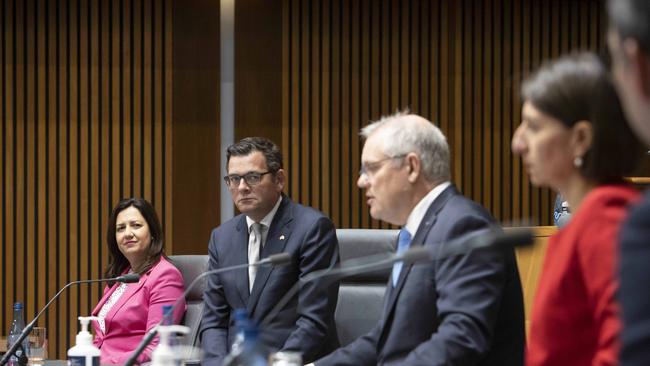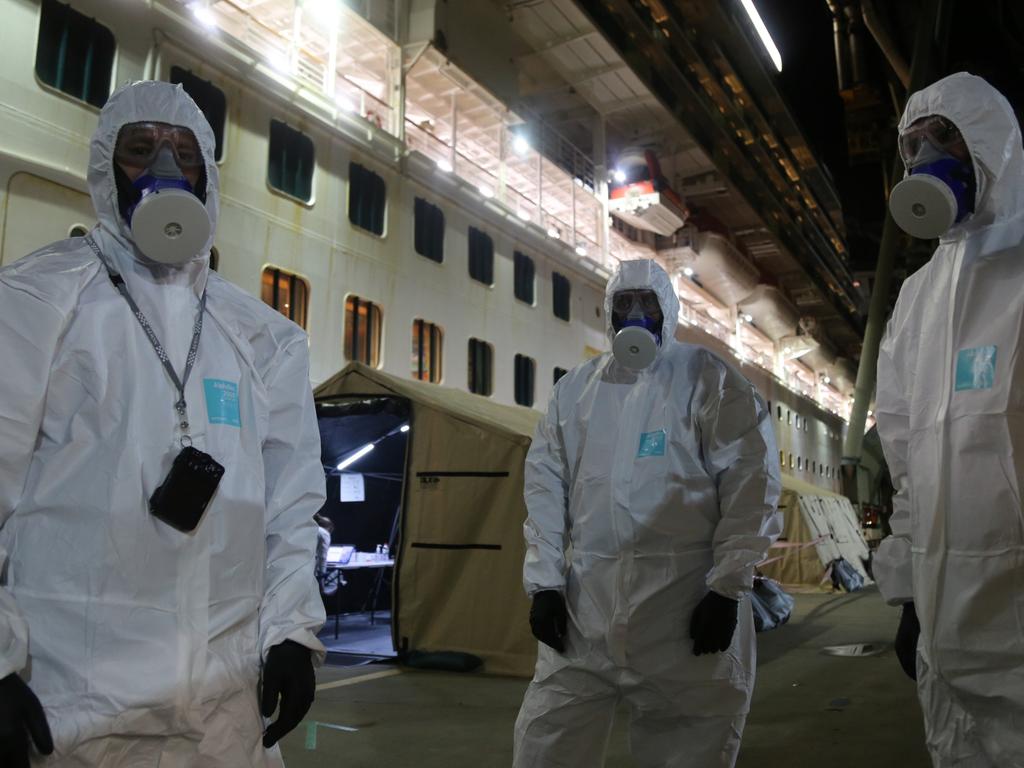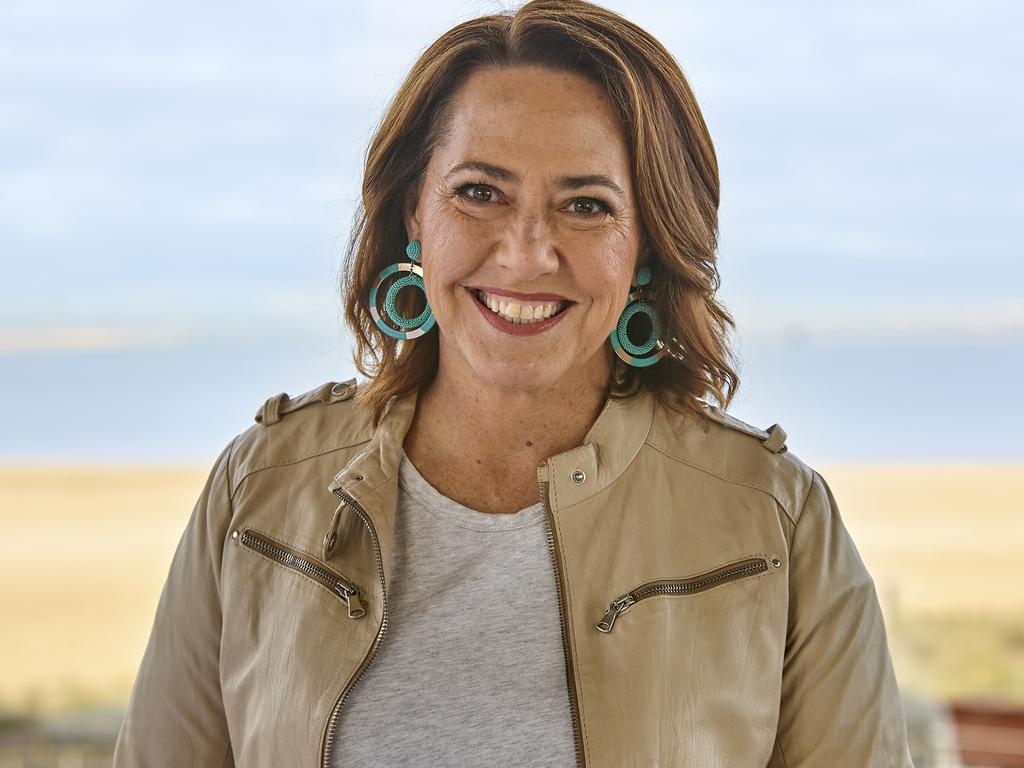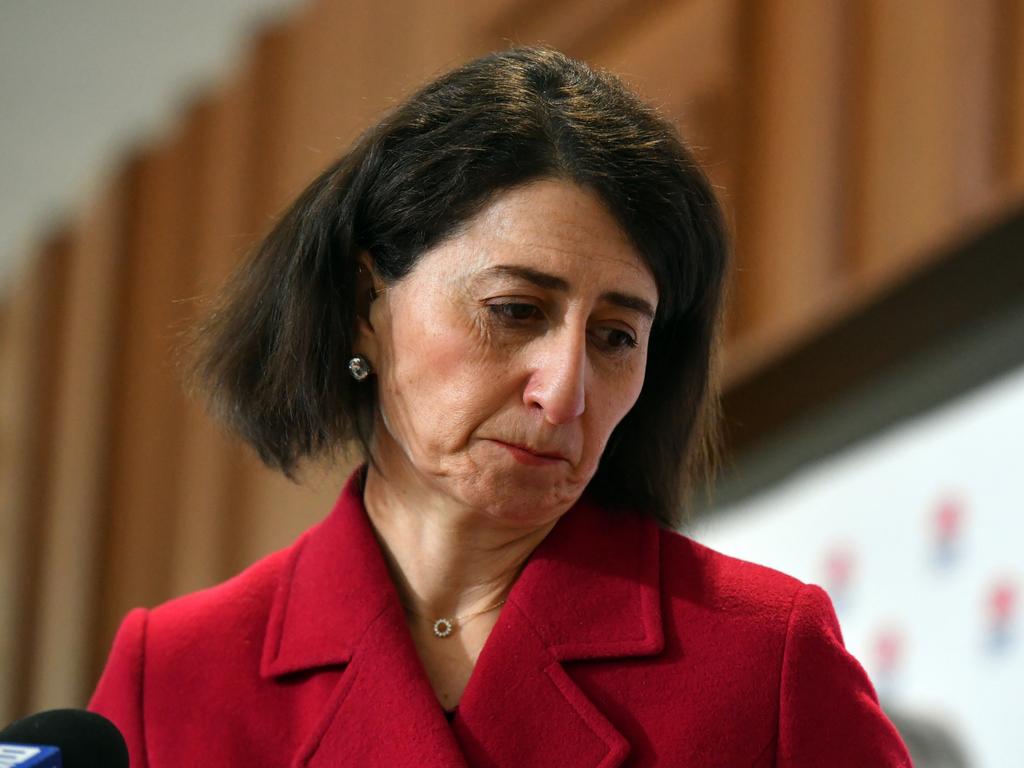Premiers the true power steering the nation
This pandemic has exposed the fragility of our national compact, our limited rights and how isolated we are from one another.

This pandemic has exposed the fragility of our national compact. It has highlighted just how limited the rights of citizens are in Australia; how isolated we are from one another. Individual compliance with the long arm of state-based law also has been on show. We are a subservient community, having never really had to fight for anything internally. Not in the way federations such as the US have, for example.
The constitutionally enshrined rights of states within the Commonwealth of Australia to use health grounds to close borders, and their willingness to do so swiftly, has been a defining feature of the pandemic. We now know Australian citizenship comes a distant second to our state-based residential status. What does that say about our cohesiveness as a community or as a nation?
Making the quagmire worse, states have the power to lock out and lock down their citizens, but they have limited financial responsibility when doing so. The federal government, courtesy of vertical fiscal imbalance, collects most of the tax revenue yet the states do most of the spending. That disparity is made up by transfers in which the federal government, on certain conditions, sends money the way of the states.
Political scientists used to think this gave the federal government the whip hand over the states, whose premiers had to come begging to Canberra for financial assistance to go about their business. Yet the pandemic has highlighted that states can embark on action that severely curtails the federal government’s capacity to raise money, without a commensurate reduced expectation of transferred assistance to follow.
On the contrary, because of the stifling impact of lockouts and lockdowns, the states want more money and assistance as the federal government’s capacity to raise funds is being diminished, often because of the states’ policy decision-making.
And guess what? Horizontal fiscal equalisation – in which laggard states are propped up financially to ensure reasonable equality nationally – means individual states can be as stifling in their decision-making as they like, confident in the knowledge the rest of the country will prop them up anyway.
This article is not a rebuttal of lockdowns or lockouts by premiers. If the pandemic has taught us anything, it is that doing nothing can be more costly than prematurely acting. I am not in the camp that believes Covid-19 should be allowed to rip through an unvaccinated population.
But we need to be mindful of the cultural impact our subservience to premiers has had on us as a nation as we move into the next phase of this pandemic; indeed, as we come out the other side. Because states now know the so-called erosion of federalism that has been written and talked about for decades – with power centralising in Canberra and premiers reduced in status to little more than glorified mayors – is a myth. Will premiers be prepared to keep borders open and not lock down once we are close to fully vaccinated? Because only they get to decide.
In a pandemic an Australian premier is more powerful than the Prime Minister, infinitely so. Scott Morrison has learnt the hard way that there is little he can control during the pandemic. Which is partly why the problems attached to the vaccine rollout – a responsibility squarely in his remit – is so damaging for the federal government. Another reason is the drift into unmeasured carping and anti-Coalition partisan commentary for its own sake in large sections of the media, but that is a topic for another day. As is the limited understanding of so many opinion-makers when it comes to how parliament, policymaking and institutional responsibilities in the political sphere actually work.
Where a federal government was once judged for its fiscal and national security competence and conservatism, in the pandemic world we live in it is judged on criteria that remove the complexity of decision-making from the debate: we needed more vaccine deals; why didn’t we build an mRNA facility right here at home; where are the pop-up purpose-built quarantine facilities to replace hotel quarantine; surely the Prime Minister knows he needs to do more to help Australian industries hit by the pandemic?
And on it goes. Never has the Monday morning quarterback had more to whinge about, with less need for evidence-based analysis to support one’s criticisms, than in Australia now.
Don’t get me wrong, mistakes have been made. But where is the perspective? How well Australia has done surviving the worst of a pandemic that has ravaged the rest of the world is dismissed as yesterday’s news. We procured millions of now unnecessarily demonised vaccines from one of the world’s leading research universities. We swiftly moved to produce the AstraZeneca vaccine here at home. We pioneered hotel quarantine as a way of keeping the virus out when other nations had their borders breached time and again. Our assistance packages for those affected by the pandemic have been and continue to be world leading.
Where is the perspective? I’d be focused on what we could do better if I thought the attacks on what we’ve done wrong weren’t so over the top at the moment.
Anyone with an ounce of understanding of big pharma and public policymaking knows how difficult building an mRNA facility outside of the US and EU is because of the technology required, the complexity of patent limitations. Yet we are moving towards that outcome. I saw a flippant comment the other day that the Australian government should just buy the publicly listed company Pfizer so we could secure more vaccines. Simple! At a lazy couple of hundred billion dollars, why not? The hit to the budget no longer would be a political problem and the government would be applauded for the bold move, except from commentators who couldn’t bring themselves to applaud Morrison for anything.
If you just read that idea and took it seriously, thinking to yourself, “That might work. That would solve our problems with the slow vaccine rollout” – guess what? You are part of the problem. As an example of public policymaking, such a purchase is beyond stupid and unrealistic. Yet, bizarrely, it is something tangible Morrison has the power to consider when he doesn’t even have the power to enforce laws permitting citizens of his own country to move freely from state to state. He can’t override state-based decisions to make it illegal for a person living alone to see another soul in their home. Premiers get to decide that now.
The Prime Minister still can make some decisions at the macro level, but at the micro level what we can do in our lives is very much dictated by state politicians.
Peter van Onselen is a professor of politics and public policy at the University of Western Australia and Griffith University.







How is a federation supposed to function cohesively when states are permitted to close off to one another without the agreed say-so of the federal government? Where does that leave citizens who might like to travel – indeed, need to travel, for work or personal reasons – between states within the country?